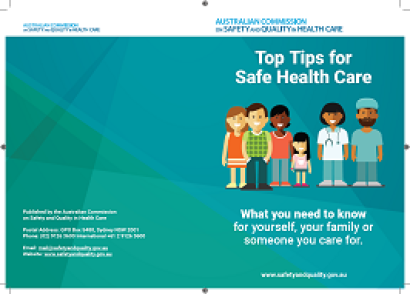The Commission has developed a series of fact sheets for consumers and carers about the NSQHS Standards (second edition) and the accreditation process.
The Commission has translated some key information for consumers into community languages.
The Recognising and Responding to Acute Deterioration Standard describes the systems and processes to respond effectively to patients when their physical, mental or cognitive condition deteriorates.
The Partnering with Consumers Standard was introduced in the first edition of the NSQHS Standards.
The Commission has developed a range of supportive resources on partnering with consumers and person-centred care.
Partnering with Consumers was introduced in the first edition of the NSQHS Standards and has been expanded in the second edition.
Monitoring, measuring and evaluating consumer partnerships is vital to ensure that these partnerships achieve their objectives and meet the needs of patients, carers, families, consumers, the workforce and the health service.
The Commission has developed range of resources describing the attributes of high-performing person-centred healthcare organisations.

